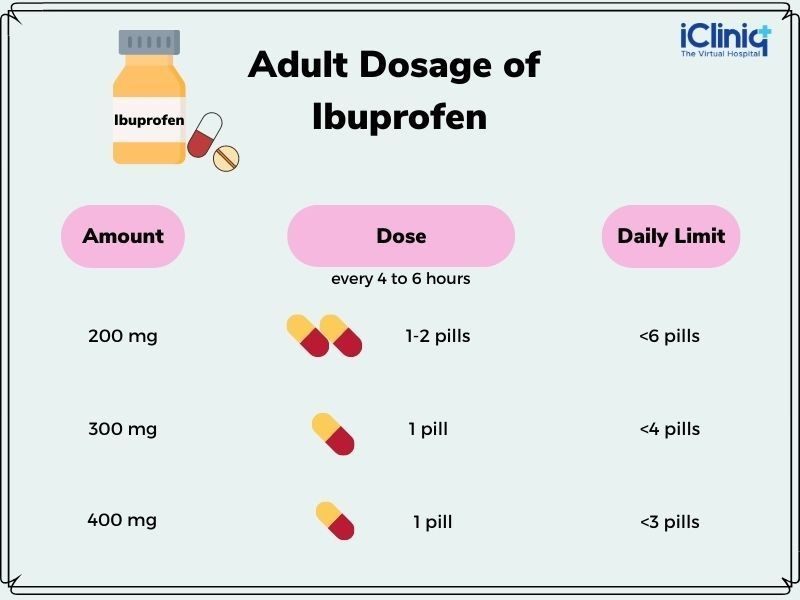
Contents
ibuprofen
Ibuprofen is a nonsteroidal anti-inflammatory drug (NSAID) used to reduce mild to moderate pain, inflammation, and fever. Other members of this class include aspirin, naproxen (Aleve), indomethacin (Indocin), nabumetone (Relafen), and others.
Pain, fever, and inflammation are promoted by the release of chemicals called prostaglandins in the body. Ibuprofen blocks the enzyme that makes prostaglandins (cyclooxygenase), resulting in lower levels of prostaglandins. This reduces inflammation, pain, and fever. The FDA approved ibuprofen in 1974.
Ibuprofen is used to treat mild to moderate pain, reduce inflammation and fever caused by various diseases. It is also used for treating menstrual cramps, osteoarthritis, rheumatoid arthritis, juvenile idiopathic arthritis, and patent ductus arteriosus.
Side effects of ibuprofen
The most common side effects of ibuprofen are:
NSAIDs reduce blood clotting ability, which may increase bleeding after an injury.
Ibuprofen may cause ulceration of the stomach or intestine, and the ulcers may bleed. Sometimes, ulcers can occur without abdominal pain. The only signs or symptoms of an ulcer may be black, tarry stools, weakness, and dizziness upon standing.
NSAIDs reduce blood flow to the kidneys and impair kidney function, especially in patients with impaired kidney function or congestive heart failure.
People allergic to other NSAIDs, including aspirin, should not use ibuprofen.
Other serious side effects associated with NSAIDs are severe allergic reactions, fluid retention, blood clots, heart attacks, hypertension, and heart failure.
NSAIDs (except low-dose aspirin) may increase the risk of potentially fatal heart attacks, stroke, and related conditions in people with or without heart disease or risk factors for heart disease. Therefore, NSAIDs should not be used for the treatment of pain resulting from coronary artery bypass graft (CABG) surgery.
Dosage for ibuprofen
- For minor aches, mild to moderate pain, menstrual cramps, and fever, the usual adult dose is 200 or 400 mg every 4 to 6 hours.
- Arthritis is treated with 300 to 800 mg 3 or 4 times daily.
- Under the care of a physician, the maximum dose of ibuprofen is 3.2 g daily. Otherwise, the maximum over-the-counter (OTC) dose is 1.2 g daily, depending on the patient’s age, weight, and medical condition.
- Individuals should not use ibuprofen for more than 10 days for pain or more than 3 days for fever unless directed by a physician.
- Children 6 months to 12 years of age usually receive 5-10 mg/kg of ibuprofen every 6-8 hours for fever and pain. The maximum dose is 40 mg/kg daily.
- Juvenile arthritis is treated with 20 to 40 mg/kg/day in 3-4 divided doses.
- Ibuprofen should be taken with meals to prevent stomach upset.
Drug interactions with ibuprofen
Ibuprofen is associated with several interactions that can affect the action of other drugs.
- Ibuprofen may increase blood levels of lithium by reducing its excretion, leading to lithium toxicity.
- Ibuprofen may reduce the blood pressure-lowering effects of certain drugs.
- When used with methotrexate or aminoglycosides, ibuprofen may increase blood levels of these drugs, potentially leading to more side effects.
- Ibuprofen increases the negative effect of cyclosporine on kidney function.
- Individuals taking oral blood thinners or anticoagulants should avoid ibuprofen to prevent excessive blood thinning and bleeding.
- Taking aspirin with ibuprofen may increase the risk of developing an ulcer.
- Excessive alcohol consumption combined with ibuprofen may increase the risk of stomach ulcers.
- Combining certain antidepressants with NSAIDs may increase the likelihood of upper gastrointestinal bleeding.
QUESTION
Is ibuprofen safe to take if I’m pregnant or breastfeeding?
- Ibuprofen is not recommended during pregnancy due to the risk of premature closure of the fetal heart’s ductus arteriosus.
- Ibuprofen is compatible with breastfeeding, according to the American Academy of Pediatrics.
Available brand names for ibuprofen
- Advil
- Pediatric Advil
- Advil/Motrin
- Advil Migraine
- Medipren
- Motrin
- Nuprin
- PediaCareChildren’s Pain Reliever/Fever Reducer
- PediaCare Infant’s Pain Reliever/Fever Reducer Fever
- Caldolor
- Duexis
- IBU-Tab
- Neoprofen (ibuprofen lysine)
- Many others
Additional information about ibuprofen
Ibuprofen preparations
- Tablets: 100, 200, 400, 600, and 800 mg
- Chewable tablets: 50 and 100 mg
- Suspension: 100 mg/5 ml and 40 mg/ml
- Intravenous solution: 10 mg/ml, 100 mg/ml
Proper storage of ibuprofen
- Ibuprofen should be stored at room temperature, between 15 C to 30 C (59 F to 86 F).
OTC and prescription availability
- Prescription is required for strengths of 400 to 800 mg and injection.
- Lower doses of ibuprofen are available over-the-counter.
Migraine Treatments:
What are your other options?
Summary
Ibuprofen, a nonsteroidal anti-inflammatory drug (NSAID), is prescribed to reduce mild to moderate pain, inflammation, and fever. It blocks the enzyme that produces prostaglandins, resulting in lower levels of prostaglandins in the body. This leads to a reduction in pain, inflammation, and fever. Ibuprofen is used to treat various diseases and conditions that cause mild to moderate pain, fever, and inflammation.


